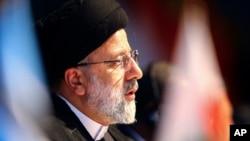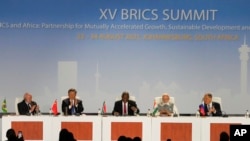Some analysts warn that the selection of nations chosen for induction into the BRICS bloc suggests the grouping as a complete could also be headed on a path towards decreased tolerance for public dissent and debate.
The five-nation creating bloc, which contains Brazil, Russia, India, China and South Africa, introduced on August 24 the admission of six nations into its fold: Argentina, Egypt, Ethiopia, Iran, Saudi Arabia and the United Arab Emirates. Their membership is predicted to turn out to be efficient in January 2024.
Of the six states, 4 — Egypt, Ethiopia, Saudi Arabia and Iran — have a historical past of closely clamping down on dissenting voices. Their inclusion attracts them nearer to Russia and China, each often called authoritarian regimes that permit little engagement by unbiased civil society teams.
Neil Melvin, director of Worldwide Safety Research at London-based Royal United Safety Institute, the U.Ok.’s oldest protection and safety coverage group, advised VOA the collection of these six nations from amongst some 40 candidates mirrored the disparate pursuits of the prevailing BRICS members.
“Argentina is there due to its neighbor Brazil. Russia and China additionally wish to herald Iran. And Egypt is there primarily due to the centrality of the hydrocarbon sector to most of the BRICS nations. And, for South Africa, it doubtless wished Ethiopia due to its centrality for African diplomacy,” he stated. The African Union is headquartered in Addis Ababa.
“We do see a gaggle of nations that actually have a democracy drawback, and that is strengthening non-democratic tendencies within the BRICS, and a human rights drawback,” Melvin stated.
The Committee to Defend Journalists has cited Ethiopia, Iran and China among the many 10 most censored nations for journalists on this planet. Like political analysts, the advocacy group desires openness on the a part of BRICS leaders.
Guillen Kaiser, CPJ’s advocacy and communications director, advised VOA that as a result of BRICS makes up “a good portion of the world’s inhabitants,” it’s crucial for member states, “a lot of that are repressive regimes,” to just accept that their individuals wish to learn.
“The general public desires transparency and accountability. Journalists present this day-after-day, with reporting that strikes markets and permits individuals to make knowledgeable choices,” she stated. “BRICS leaders should settle for that in the end, their chokehold on the circulation of data isn’t grounded in actuality and it’s of their curiosity to embrace a free press.”

Melvin famous that the BRICS growth follows Russia’s invasion of Ukraine and the refusal by some nations in Asia, Africa and Latin America to affix the USA and most of Europe in retaliatory sanctions.
The growth, he stated, is perhaps a sign of the bloc’s resolve to steer a brand new type of World South motion to broaden its legitimacy. “However I believe that is going to be a really troublesome agenda as a result of it’s comparatively simple to complain concerning the current [world] order.”
Melvin stated if BRICS expects to supply a substitute for the West, it must handle the challenges confronted by its incoming members — an financial disaster in Argentina and large money owed confronted by Ethiopia and Egypt.
“The West has been battling this for a few years,” he stated. “So, can China, Russia and the remainder truly put one thing collectively? That’s the query they’ve placed on themselves, they usually’re going to should reply that.”
Mandeep Tiwana, chief officer for proof and engagement at CIVICUS, a worldwide civil society alliance, advised VOA that most of the newly inducted BRICS members have a file of suppressing human rights and dismantling the democratic aspirations of their individuals.

“BRICS is, in a way, making an attempt to reframe world governance,” Tiwana stated. “As a result of when you’ve got governments which might be totalitarian in nature, it’ll create extra challenges for individuals all over the world somewhat than resolve challenges or create a greater life for all.”
Tiwana stated with Russia and China having disproportionate affect inside the bloc, it’s nonetheless not clear whether or not democratic states like Brazil, India and South Africa can have a optimistic affect on the opposite members.
“The leaders haven’t brazenly spoken about this, and our analysis reveals that 4 of the nations BRICS is admitting have severe civic house restrictions, and so it doesn’t augur properly for people-centered decision-making while you virtually haven’t any unbiased civil society in these nations,” he stated.
“Our hope is that nations with democratic traditions inside the BRICS alliance can affect the others to be extra open to civil society to allow them to contain individuals of their decision-making.”
South Africa’s President Cyril Ramaphosa stated BRICS would broaden extra sooner or later.
This story originated in VOA’s English to Africa Service.
